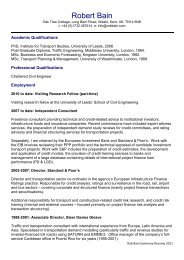Disincentivising overbidding for toll road concessions
Disincentivising overbidding for toll road concessions
Disincentivising overbidding for toll road concessions
- No tags were found...
You also want an ePaper? Increase the reach of your titles
YUMPU automatically turns print PDFs into web optimized ePapers that Google loves.
DISINCENTIVISING OVERBIDDING FOR TOLL ROAD CONCESSIONS<br />
Conclusions<br />
••<br />
Over-bidding is a phenomenon observed in many situations in many countries. Opportunities exist to learn<br />
lessons from international <strong>toll</strong> <strong>road</strong> procurement practice and from other sectors that share common<br />
characteristics and experiences.<br />
••<br />
Given the unpredictability of traffic projections generally (and opening-year projections <strong>for</strong> greenfield projects<br />
specifically), the policy goal should be <strong>for</strong>ecasting realism (rather than accuracy), with the elimination of clearly—<br />
and sizeably—biased bid submissions as the core objective.<br />
••<br />
Procurement practice needs to ensure that the downside (penalties) <strong>for</strong> submitting unrealistically high traffic and<br />
revenue <strong>for</strong>ecasts is greater than any upside (benefits).<br />
••<br />
In the pre-procurement phase, attention needs to focus on rigorous and transparent project vetting—with an<br />
emphasis on value-<strong>for</strong>-money assessment—such that any public sector or political pressures to oversell projects<br />
to the private sector (particularly <strong>for</strong> short-term gains) are discouraged and neutralised.<br />
••<br />
In terms of concession design, any incentives <strong>for</strong> excessive risk-taking should be avoided, yet concessionaires<br />
should not be insulated from traffic risk. Concession design needs to ensure that a balance of upside and<br />
downside risks remains, allowing <strong>for</strong> normal risk/reward returns. One design avenue worth further investigation<br />
is illustrated through the GB rail franchising case study, which seeks to separate (and treat differently) the<br />
influences of exogenous from endogenous factors in terms of revenue risk exposure. This would require the<br />
procuring client body to assess actively bid deliverability within its assessment criteria.<br />
••<br />
The accounting treatment that different risk-allocation arrangements attract can be problematic. Accounting<br />
‘tricks’ can damage the reputation of companies and of governments.<br />
••<br />
Turning to the bidding process, aggressive price-based competitions allied to deal scarcity clearly drive<br />
<strong>overbidding</strong>. In response, many concession and licence grantors are today placing much more emphasis on<br />
efficiency (rather than revenue) maximisation. The use of bidder deposits, with the size of the deposit linked to<br />
the size of the bid, may also have a role in terms of incentive realignment.<br />
••<br />
Many commercial collapses of <strong>toll</strong> <strong>road</strong>s around the world are a direct result of aggressive financings with too<br />
much debt. This suggests that some attention might usefully be directed at the capital structures being proposed<br />
by bidders, perhaps with a target structure (percentage equity component), equity lock-ups or lock-ins, or<br />
equity ratchets based on the bid size itself. Bid appraisal may seek to differentiate between alternative capital<br />
structuring proposed by bidders and apply weightings to penalise over-aggressive bidders. ‘Skin-in-the-game’ lies<br />
behind many successful international <strong>toll</strong> <strong>road</strong> <strong>concessions</strong>.<br />
••<br />
When considering bid appraisal, far more attention needs to be placed on assessing and testing the deliverability<br />
of bidder submissions and plans, and the assumptions embedded in their financial models. The trade-off—a<br />
possibly reduced sale price—would appear to be worthwhile, particularly over the long run and from a ‘bigger<br />
picture’ perspective. Failed <strong>concessions</strong> are in no-one’s long-term interest. The recent move away from upfront<br />
payments in Australian <strong>concessions</strong> is beneficial in this regard.<br />
• • Greater use should be made of independent technical and commercial oversight of bidders’ plans—particularly<br />
their <strong>for</strong>ecasts. Left to the private sector, the role of ‘peer reviewer’ or auditor is often diminished to the point<br />
of being presentational. As such, the public sector needs to take the lead, creating structures that embed<br />
independent reviews in the bid appraisal process.<br />
4






